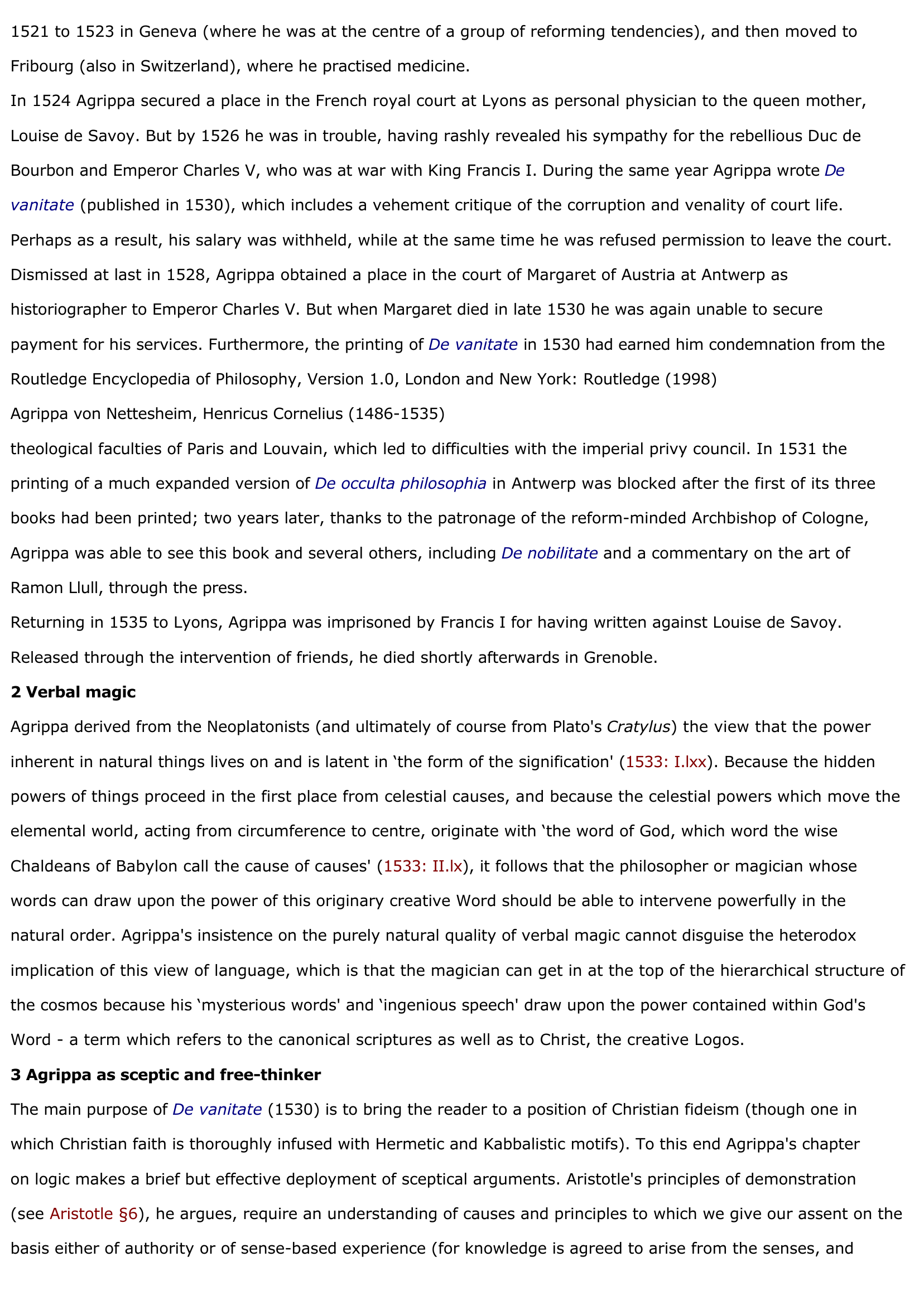Encyclopedia of Philosophy: Agrippa von Nettesheim, Henricus Cornelius
Publié le 11/01/2010

Extrait du document
Born to a family of the lesser nobility in Cologne (from whose Latin name, Colonia Agrippina, he drew his humanist cognomen), Agrippa took his first degree at Cologne in 1502; after further studies in Paris and elsewhere, he claimed to have doctorates in canon law, civil law and medicine - and also to have been knighted in recognition of military service. In 1508 he took part in an unsuccessful military adventure which a secret occultist society, of which he was a member, undertook in Spain, possibly at the behest of Emperor Maximilian I. Members of this society subsequently became prominent in French humanist and court circles, providing Agrippa with a network of supporters upon whom, as his reputation for encyclopedic learning grew, he was able to draw in his searches for patronage. When in 1509 he lectured on Reuchlin’s Kabbalist philosophy at the University of Dôle in
Franche-Comté and wrote De nobilitate (published in 1532), Agrippa had hopes of preferment in the court of
Margaret of Austria, Regent of Franche-Comté and the Low Countries. These were dashed when he was
denounced at court by a prominent Franciscan as a ‘judaizing heretic’. Returning to Germany, in 1510 he
completed the first version of De occulta philosophia (published in 1533), and in the same year travelled to
England, apparently in the service of Maximilian I.
«
1521 to 1523 in Geneva (where he was at the centre of a group of reforming tendencies), and then moved to
Fribourg (also in Switzerland), where he practised medicine.
In 1524 Agrippa secured a place in the French royal court at Lyons as personal physician to the queen mother,
Louise de Savoy.
But by 1526 he was in trouble, having rashly revealed his sympathy for the rebellious Duc de
Bourbon and Emperor Charles V, who was at war with King Francis I.
During the same year Agrippa wrote De
vanitate (published in 1530), which includes a vehement critique of the corruption and venality of court life.
Perhaps as a result, his salary was withheld, while at the same time he was refused permission to leave the court.
Dismissed at last in 1528, Agrippa obtained a place in the court of Margaret of Austria at Antwerp as
historiographer to Emperor Charles V.
But when Margaret died in late 1530 he was again unable to secure
payment for his services.
Furthermore, the printing of De vanitate in 1530 had earned him condemnation from the
Routledge Encyclopedia of Philosophy, Version 1.0, London and New York: Routledge (1998)
Agrippa von Nettesheim, Henricus Cornelius (1486-1535)
theological faculties of Paris and Louvain, which led to difficulties with the imperial privy council.
In 1531 the
printing of a much expanded version of De occulta philosophia in Antwerp was blocked after the first of its three
books had been printed; two years later, thanks to the patronage of the reform-minded Archbishop of Cologne,
Agrippa was able to see this book and several others, including De nobilitate and a commentary on the art of
Ramon Llull, through the press.
Returning in 1535 to Lyons, Agrippa was imprisoned by Francis I for having written against Louise de Savoy.
Released through the intervention of friends, he died shortly afterwards in Grenoble.
2 Verbal magic
Agrippa derived from the Neoplatonists (and ultimately of course from Plato's Cratylus ) the view that the power
inherent in natural things lives on and is latent in ‘the form of the signification' ( 1533: I.lxx ).
Because the hidden
powers of things proceed in the first place from celestial causes, and because the celestial powers which move the
elemental world, acting from circumference to centre, originate with ‘the word of God, which word the wise
Chaldeans of Babylon call the cause of causes' ( 1533: II.lx ), it follows that the philosopher or magician whose
words can draw upon the power of this originary creative Word should be able to intervene powerfully in the
natural order.
Agrippa's insistence on the purely natural quality of verbal magic cannot disguise the heterodox
implication of this view of language, which is that the magician can get in at the top of the hierarchical structure of
the cosmos because his ‘mysterious words' and ‘ingenious speech' draw upon the power contained within God's
Word - a term which refers to the canonical scriptures as well as to Christ, the creative Logos.
3 Agrippa as sceptic and free-thinker
The main purpose of De vanitate (1530) is to bring the reader to a position of Christian fideism (though one in
which Christian faith is thoroughly infused with Hermetic and Kabbalistic motifs).
To this end Agrippa's chapter
on logic makes a brief but effective deployment of sceptical arguments.
Aristotle's principles of demonstration
(see Aristotle §6 ), he argues, require an understanding of causes and principles to which we give our assent on the
basis either of authority or of sense-based experience (for knowledge is agreed to arise from the senses, and.
»
↓↓↓ APERÇU DU DOCUMENT ↓↓↓
Liens utiles
- Agrippa von Nettesheim, Heinrich Cornelius - occultisme.
- PHILOSOPHIE OCCULTE (DE LA), Cornélius Agrippa von Nettesheim - résumé de l'oeuvre
- Encyclopedia of Philosophy: Agrippa
- Cornelius, Peter von - vie et oeuvre du peintre.
- Cornelius, Peter von - biographie du peintre.

































